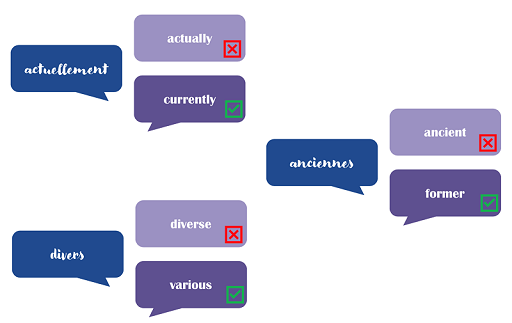4 False friends
Hopefully you are now feeling more confident that French vocabulary need not be a huge challenge, when you have an arsenal of useful skills to aid your learning. Finding immediately recognisable words is a valuable tool for deciphering meaning. Beware though – there is a complication with what you’ve just learned. You are now going to enter the perilous world of the ‘false friend’. A false friend is a word that looks like a cognate – and therefore looks as if it means one thing – but in fact it has a different meaning entirely. The image below provides some examples.
Don’t let this undermine your growing confidence. Being aware that false friends are out there will drive you to learn vocabulary more carefully. When you encounter false friends a few times you’ll learn to recognise them. You may even find that you remember the false friends more easily – it sticks in your mind that they don’t have the meaning you initially expect. The next activity presents a few more false friends which you could try and memorise.
Activity 6 Translate the false friends
Choose the correct translation for these French words, bearing in mind that they are all false friends.
a.
to wait
b.
to attend
The correct answer is a.
a.
money
b.
small change
The correct answer is b.
a.
cheerful
b.
pretty
The correct answer is b.
a.
day
b.
journey
The correct answer is a.
a.
library
b.
bookshop
The correct answer is b.
a.
place
b.
rental
The correct answer is b.
a.
coin
b.
corner
The correct answer is b.
a.
jam
b.
condom
The correct answer is b.
Knowing the meaning of some false friends in one language will help you to recognise them in other related languages, where they are still cognates. For example, you might not know that the French for ‘advertisement’ is annonce, but with that established, it probably won’t surprise you very much that in Italian it’s annunzio, in Spanish anuncio and in Portuguese anúncio.
False friends have the potential to cause amusing or even awkward situations, but remember that misusing or misunderstanding a false friend will rarely cause any real communication problems. It is good practice for language learners to identify and learn false friends, but on the other hand, it’s also important not to get too preoccupied with avoiding errors. The rewards for learning French and communicating with people far outweigh any occasional slips!

